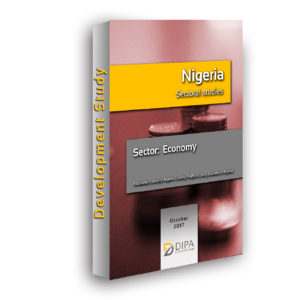 Nigeria is located at the extreme inner corner of the Gulf of Guinea on the west coast of Africa and has a tropical climate with variable rainy and dry seasons, depending on location.
Nigeria is located at the extreme inner corner of the Gulf of Guinea on the west coast of Africa and has a tropical climate with variable rainy and dry seasons, depending on location.
Nigeria, commonly known as the giant of Africa with more than 180 million people is the most populous country in Africa. With a democratic presidential system of government, it has an economy which is based on its rich natural resources, traditional agriculture and the trade sector. The country has a rich land of diverse cultural heritage, with more than 250 ethnic groups, including a wide array of religions and sophisticated visual arts.
It not only shows high potential in human resources but also is endowed with rich natural resources such as oil, gas and minerals. The country aims to develop other productive sectors, boosted by the size of its population and economy, it is a regional powerhouse.
Nigeria is one of the largest economies in Africa, with a GDP of USD 481,1 billion and a steady growth which however slowed sharply from 6,3% in 2014 to 2,7% in 2015. Growth in 2016 is expected to decline further to 2,3%, with non-oil sector growth projected to slow from 3,6% in 2015 to 3,1% in 2016 before recovering to 3,5% in 2017. Moreover, one of the bigger events of Nigeria’s foreign exchange policy happened in June 2016, when Nigeria’s central bank allowed the Naira exchange rate to be market-driven, switching from a fixed exchange rate policy.
Exports in Nigeria reached 50,74 billion USD in 2015, earning it a ranking of 52 in a global scale. However, exports fell significantly in 2015 in comparison to 2014, when they reached 82,59 billion USD. Imports of Nigeria stood at 48,41 billion USD in 2015 (51st in the world), down from the recorded 61,59 billion USD in 2014. Inflation in Nigeria jumped by 17,1 percent year-on-year in July of 2016.
Nigeria’s unemployment rate was recorded at 13,3% in second quarter of 2016, up from 12,1 percent in the three months to March, reaching the highest since 2009. Meanwhile, youth unemployment increased to 24% from 21,5%.
Last but not least, the Business Environment in Nigeria can be characterized as unsupportive, with the World Bank ranking it (ease of doing business) 170 out of the 189 countries surveyed in its 2016 “Doing Business” report.
1. Country Profile
1.1 History of Nigeria
1.1.1. Early History
1.1.2. The Colonial period
1.1.3. Independence and Internal Conflict
1.1.4. Modern Nigeria
1.2. Geography
1.2.1. Area and Boundaries
1.2.2. Topography
1.2.3. Resources and Land Use
1.2.4. Environmental Concerns
1.3. People and Society
1.3.1. Population and National Identity
1.3.2. Demographics
1.3.3. Societal Characteristics
1.4. Government
1.4.1. Framework of Government
1.4.2. Legislative and Judicial Branch
1.4.3. Political Parties and Leaders
1.4.4. Foreign Relations
1.4.5. Political Pressure Groups
1.5. Main Infrastructure
1.5.1. Tele Communications
1.5.2. Transportation
1.5.3. Energy
2. Economic Monitor
2.1. Economic Environment
2.1.1. GDP
2.1.2. Exports, Imports
2.1.3. Inflation and price indices
2.1.4. Labor market
2.2. Fiscal Strategy (2016-2018)
2.2.1. Macroeconomic Stability and Efficient Resource Allocation
2.2.2. Social Development
2.2.3. Infrastructure for Development
2.2.4. Improving Governance
2.3. Budget and strategic implementation plan (2016)
2.3.1. Budget
2.3.2. Strategic Implementation Plan
2.4. Monetary, Credit, Foreign Trade and Exchange Policy (Fiscal years 2016/2017)
2.4.1. Monetary and Credit Policy Measures for 2016/2017
2.4.2. Interest rates
2.4.3. Foreign Trade & Exchange Policy
2.5. Investment Climate
2.6. Outlook for the Domestic Economy in 2016/2017
3. Financial Sector and Banking
3.1. Banks in Nigeria
3.1.1. Brief History
3.1.2. 2004-2005 Consolidation
3.1.3. Special Examination of Banks – August and October 2009
3.1.4. The list of Banks today
3.1.5. Supervisory Mechanisms of the Nigerian Banking System
3.2. The Nigerian Stock Exchange
3.2.1. Products
3.2.2. Regulation
3.2.3. Largest companies in Nigeria (Market Value)
3.3. Regulatory Authorities
4. Doing Business
4.1. Starting a Business
4.2. Dealing with Construction Permits
4.3. Getting Electricity
4.4. Registering Property
4.5. Getting Credit
4.6. Protecting Minority Investors
4.7. Paying Taxes
4.8. Trading across Borders
4.9. Enforcing Contracts
4.10. Resolving Insolvency
